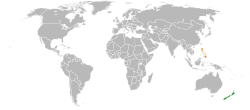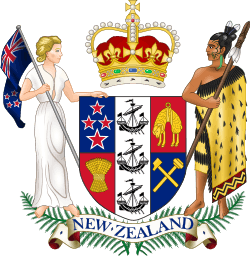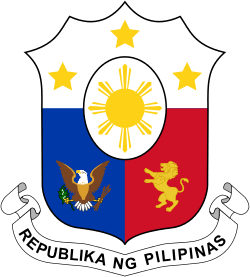New Zealand–Philippines relations
 |
|
New Zealand |
Philippines |
|---|---|
New Zealand and the Philippines shares diplomatic, trade, military and economic relations. The Philippines and New Zealand were partners in the Korean War and the Vietnam War. The Philippines has an embassy in Wellington and 2 other consulates, one in Auckland and in Christchurch and New Zealand maintain an embassy in Manila. There are over 40,000 Filipinos residing in New Zealand.[1]
Military relations
World War I and II
Philippine–New Zealand military relations date back to World War I and World War II, where the Philippines and New Zealand both fought for the Allied side.
Cold War
The Philippines and New Zealand fought together during the Korean War (1950–1953) under a UN led "Police Action" to counter a North Korean invasion of South Korea.
The Philippines and New Zealand also fought together during the Vietnam War in support of the United States and South Vietnam to counter a North Vietnam invasion and Viet Cong insurgency in South Vietnam.
The Philippines deployed 10,450 Filipino troops under the Philippine Civic Action Group-Vietnam and New Zealand deployed 552–3,000 troops to Vietnam.
During the course of the Cold War, The Philippines and New Zealand were both part of Southeast Asia Treaty Organization from 1954 to 1977. The Royal New Zealand Air Force has also conducted exercises in the Philippines.
War on Terror
After the September 11 attacks in the United States, both the Philippines and New Zealand supported the resulting US-led War on Terror. The Philippines and New Zealand has both deployed troops in support of the US-led Iraq War, where The Philippines delivered 51 troops and New Zealand deployed 61 troops to Iraq.
Peacekeeping operations
New Zealand and The Philippines have both deployed peacekeeping forces to East Timor.
Bilateral relations


New Zealand Ambassador to the Philippines Andrew Matheson said that their total exports to the Philippines last year amounted to about US$475 million representing a 30% increase from 2009 making the Philippines one of their major export market.[2]
Philippine Foreign Affairs Secretary Albert del Rosario made a two-day official visit to New Zealand upon the invitation of Foreign Minister Murray McCully. Secretary del Rosario kicked off his visit with a lunch meeting with the Board of Directors of the New Zealand–Philippines Business Council included Dairyland Chief Executive Officer Keith Jackson, Ambassador Graeme Waters, Special Adviser of the Ministry of Foreign Affairs and Trade as officials of the Philippine Embassy in Wellington. The Secretary noted the increasing business activities between the Philippines and New Zealand as more companies in both countries explore and engage in business and investment opportunities in the dairy, information technology, geothermal and other sectors.[3]
In October 2012, President Benigno Aquino III made a state visit to New Zealand. He witnessed the signing of three bilateral agreements meant to further strengthen diplomatic relations between Manila and Wellington. The signing followed a bilateral meeting between President Aquino and Prime Minister John Key, both held at the Parliament Building. The accords deal with a reciprocal working holiday scheme, defense cooperation and geothermal energy.[4]
Police assistance
The New Zealand police is currently helping the Philippine National Police combat methamphetamine.[5] The New Zealand Police also helps in providing training to the Philippine National Police.[6]
Others
The 1936 Census found six New Zealand residents born in the Philippines, and the country's intake of Filipino students began to increase in 1960, under the Colombo Plan; however, even as late as 1981, there were only 405 Filipinos in New Zealand. It would take until the 1990s before highly populated regions such as Wellington and Auckland (especially the suburbs of Henderson and Mount Roskill) began to see exponential growth in their respective Filipino communities.[7] The communities themselves are known for their many Philippine-related celebrations, particularly the celebration of Philippine Independence Day every year on the Sunday nearest to 12 June. In April 2008, New Zealand's embassy indicated that they would like to increase the intake of nurses and engineers from the Philippines.[8]
References
- ↑ "Ethnic Group (detailed total responses)", 2013 Census, Statistics New Zealand, 15 April 2014
- ↑ "New Zealand eyes more business partnerships". Inquirer Global Nation. 18 February 2011.
- ↑ "Philippine-New Zealand Relations take another step forward". DFA. 23 August 2012.
- ↑ "Philippines, New Zealand ink 3 bilateral pacts". Inquirer Global. 23 October 2012.
- ↑ "NZ police take drug fight offshore". Television New Zealand. 5 September 2009. Retrieved 30 September 2011.
- ↑ New Zealand Aid Programme
- ↑ Walrond, Karl (21 September 2007), "New Zealand Peoples: Filipinos", Te Ara Encyclopedia of New Zealand, Ministry for Culture and Heritage, ISBN 978-0-478-18451-8, retrieved 2008-04-11
- ↑ "New Zealand needs Filipino nurses", GMA News, 7 April 2008, retrieved 2008-04-11

